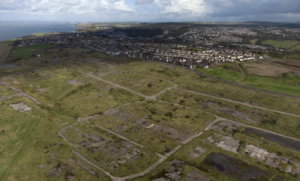Court rules against West Cumbria Mining’s fossil fuel development in Whitehaven

The site of the proposed new coalmine near the town of Whitehaven. Photograph: Jon Super/AP
The UK’s first new coalmine in 30 years will not be allowed to go ahead after a ruling in the high court.
On Friday morning, Justice Holgate ruled plans for the facility to be built in Whitehaven, Cumbria will not go ahead.
New fossil fuel projects are thought to be on shakier legal ground after the precedent set by a landmark supreme court decision that quashed planning permission granted for an oil drilling well at Horse Hill, on the Weald in Surrey. The judgment found the climate impact of burning coal, oil and gas must be taken into account when deciding whether to approve projects.
This was the first court decision on plans for a new fossil fuel development since the ruling.
The new Labour government earlier this year withdrew its support from the Whitehaven mine in the Cumbria legal case. Lawyers acting for Angela Rayner, the secretary of state for housing, communities and local government, said there had been an “error in law” in the decision to grant planning permission for the mine in December 2022.
Withdrawing its defence against two legal challenges by Friends of the Earth and South Lakes Action on Climate Change, the government instead informed the court that the planning permission should be quashed. The case proceeded as the developer of the mine, West Cumbria Mining (WCM), still wanted to defend the original decision to approve it.
Emissions from the burning of the coal from the proposed Whitehaven mine were not included in the developer’s climate assessment. The mine’s total lifetime emissions, almost entirely from the burning of the coal, were forecast to exceed 220m tonnes of CO2
During the hearing, lawyers acting for Friends of the Earth said that given the decision by the supreme court in the Surrey case, the climate impact of burning coal, oil and gas should have been taken into account when deciding whether to approve the project.
“WCM … failed to quantify or assess the downstream combustion emissions from the coal extracted from the mine,” they submitted.



